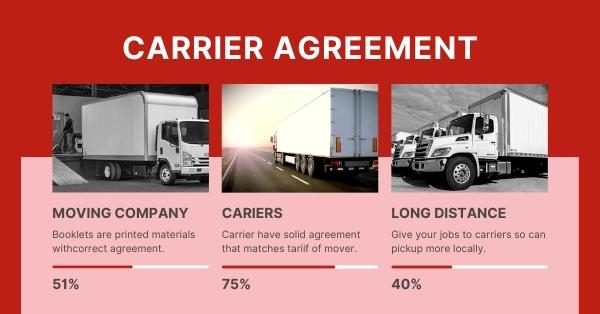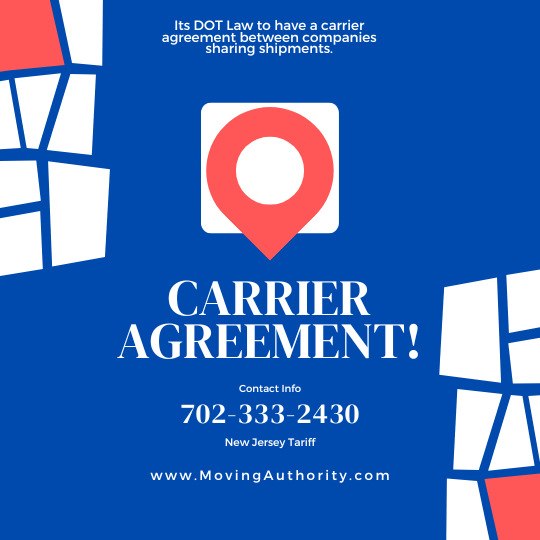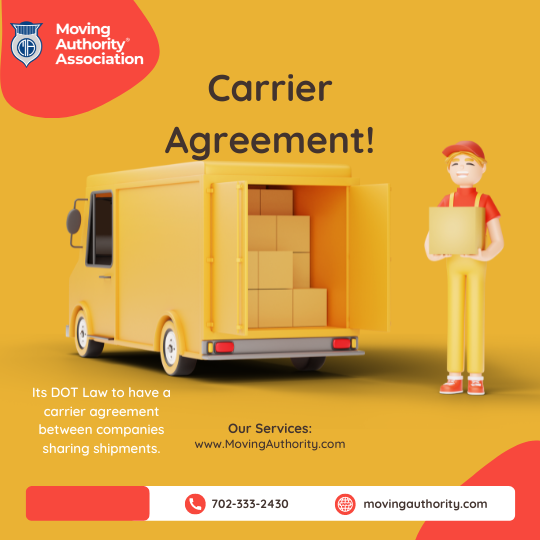

Carrier Agreement $499
$ 499.95 Only






Product Code: 44
Product Description











Product Code: 44




They are also required by the United States government. Otherwise, a business cannot take place for moving companies, carriers, and customers. A carrier agreement serves as a household goods contract. It enables motor carriers to haul truck household goods on behalf of each household goods customer. Click on Arbitration Program
Household goods companies begin the carrier agreement process by negotiating rates. This takes place before any specific terms of a contract have gotten decided. Once a final decision gets met, a carrier agreement for household goods is in place. about Warehouse Receipt.

New Jersey Moving Company Tariffs
Here is one of the most common. Say a household goods customer makes a post on a load board. The post states that a load has to get picked up in Miami and go to New York City. The potential client offers to pay a carrier $2,000. But that offer is not good enough for the interested carrier . Movers Company Training
The carrier asks for $3,000. Next, the two parties negotiate so that the carrier can receive a desirable rate. The parties then agree that $2,500 is a solid rate.
The carrier agreement should include the following five pieces of information.
1. The carrier and customer’s information. (This includes the MC Number#.)
2. The date of the agreement.
3. The number of days to pay.
4. Specific procedures of invoicing.
5. Insurance and liability information.Click on Company registration
Agreements are important because carriers must make sure that they will get paid. Plus, they need to know the level of liability that's required.
Know about Get Company Ad 1 month State.

The first step is to put a date on each page of the agreement. You should also put your initial on each page of the document. Some companies will ask that you only fill out the last page of the carrier agreement. But many industry experts recommend signing every single page. Know about Carrier Agreement .
This is to help ensure that you agree to each term within the document. Include the following information on the last page of each carrier agreement.
1. The company/carrier name. (changes are explained on Company registration )
2. An authorized signature.
3. A print name.
4. The title of the signee.
5. The address of the company.
6. The city, state, zip code, and country.
7. A phone number. You might also want to include an email address.
Many organizations will include a W-9 form to fill out that accompanies the carrier agreement. You can also include a copy of your authority and insurance information.
Must check out Extra consultation with a tariff specialist.

The shipper is the organization/individual that serves as the client. This means that the shipper is the owner/supplier of all shipped commodities. The shipper is sometimes also called the “consignor.” The carrier is the organization or individual responsible for transporting the goods. Click on Local Contracts.
.DOT Number Deactivation But transportation is not valid under U.S. law until a carrier agreement gets signed by both parties. Keep in mind that carriers have more responsibilities than shippers do.
Click on Emergency service 1
They are private carriers and common carriers. USDOT Common carriers are often businesses that specialize in household goods transportation. This can apply to trucking, railroad, and airline transportation. Their business model revolves around transporting property from one place to another. Please visit .
Membership The role of the carrier is a simple concept when it comes to the logistics of household goods trucking. A carrier is any company that has the legal means to transport goods. Most carriers work with shippers. Leads The carriers specialize in shipping goods from one location to another. But shipments are invalid unless a carrier agreement itself is valid. That’s why it’s important to make sure that your agreements meet all legal requirements. Leads Local Otherwise, carriers risk receiving large fines and penalties. Feel free to contact our organization today for more information about carrier agreements.
Leave a review
Take a few minute to give your value review about our product